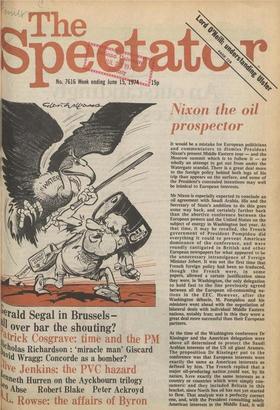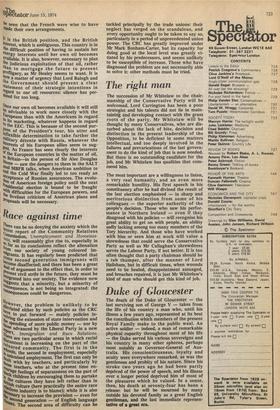Nixon the oil prospector
It would be a mistake for European politicians and commentators to dismiss President Nixon's present Middle Eastern tour — and the Moscow summit which is to follow it — as wholly an attempt to get out from under the Watergate scandal. There is a great deal more to the foreign policy behind both legs of his trip than appears on the surface, and some of the President's concealed intentions may well be inimical to European interests.
Mr Nixon is especially expected to conclude an oil agreement with Saudi Arabia. His and the Secretary of State's ambition to do this goes some way back, and certainly further back than the abortive conference between the European powers and the United States on the subject of energy in Washington last year. At that time, it may be recalled, the French government of President Pompidou did everything it could to prevent American dominance of the conference, and were roundly castigated in British and other European newspapers for what appeared to be the unnecessary intransigence of Foreign Minister Jobert. It was not the first time that French foreign policy had been so traduced, though the French were, in some papers, allowed a certain justification since they were, in Washington, the only delegation to hold fast to the line previously agreed between all the European oil-consuming nations in the EEC. However, after the Washington debacle, M. Pompidou and his ministers went ahead with the negotiation of bilateral deals with individual Middle Eastern nations, notably Iran; and in this they were a great deal more successful than their European partners.
At the time of the Washington conference Dr Kissinger and the American delegation were above all determined to protect the Saudi Arabian interests of the US oil giant Aramco. The proposition Dr Kissinger put to the conference was that European interests were exactly the same as American interests as defined by him. The French replied that a major oil-producing nation ould not, by its nature, hive exactly the same interests as a country or countries which were simply consumers: and they included Britain in this bracket, since North Sea oil has not yet started to flow. That analysis was a perfectly correct one, and, with the President consulting solely American interests in the Middle East, it will be seen that the French were wise to have Made their own arrangements.
!t is the British position, and the British interest, which is ambiguous. This country is in the difficult position of having to sustain her energy interests until her own oil becomes aVailable. It is also, however, necessary to plan e judicious exploitation of that oil, rather 'flan to mortgage the future to present Profligacy, as Mr Healey seems to want. It is a matter of urgency that Lord Balogh and tie Government should present a clear statement of their strategic intentions in regard to our oil resources: silence has persisted for too long.
°nee our own oil becomes available it will still advisable to work more closely with the tnr.oPeans than with the Americans in regard to its marketing, whatever happens in regard ° the EEC. This is because of the second purPose of the President's tour, his utter and InPexible determination to take further the ilulitary détente with Russia, whatever the interests of his European allies seem to sugg.e8t. As France has seen clearly the interests °I the European countries in the matter of oil, Britain—in the person of Sir Alec Douglas °113e — saw the dangers to them in the SALT ,„. MBFR talks, when American ambition to `114 the Cold War finally led to too ready an a:cePtance of Russian assurances. The evoluen of American foreign policy until the next 'residential election is bound to be fraught ttvith difficulties for the European powers, and „Ile liveliest criticism of American plans and "roPosals will be necessary.



































